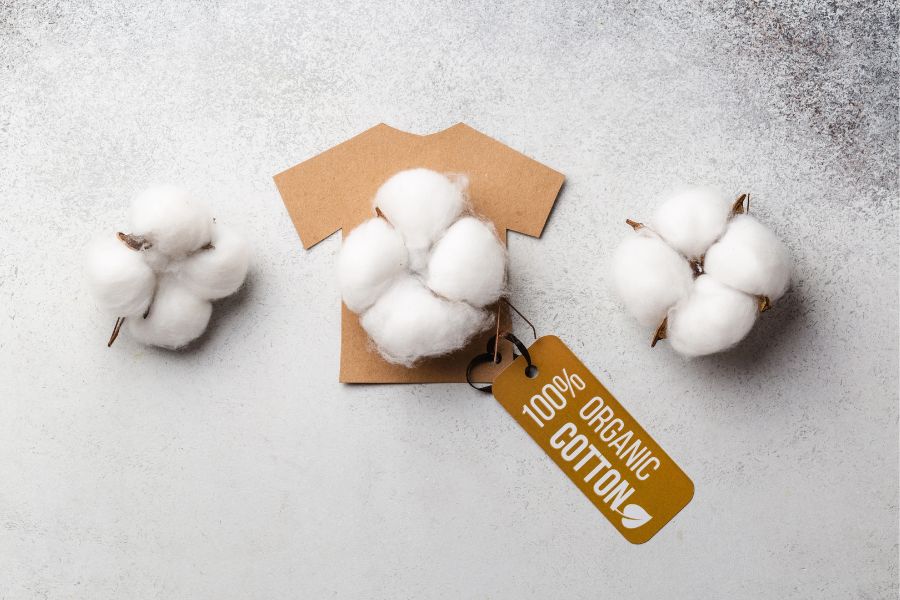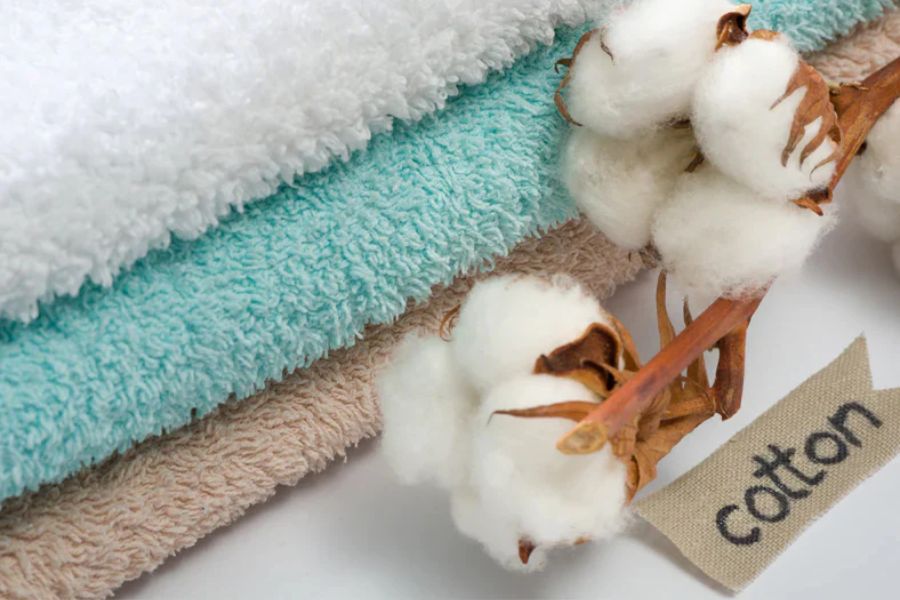
What Is Organic Cotton? Why Is Cotton Sustainable?
Key Takeaways
- Today, organic cotton is one of the most sustainable materials for the apparel industry. Its farming and processing are eco-friendly. It involves no fertilizers, no genetically engineered seeds, and more.
- But how about conventional cotton? Is cotton sustainable? The answer is yes and no, depending on many factors. For more details, let's read on!
What Is Organic Cotton?
As sustainable living patterns are becoming a new trend, people now prefer more eco-friendly clothes rather than fast fashion. That's why organic cotton is becoming more popular today.
Understanding Organic Cotton
Organic cotton grows from non-genetically modified cotton (non-GMO) seeds with no fertilizers or pesticides. The entire cultivation process must follow Global Organic Textile Standard (GOTS) standards.
Also, cotton processing in factories, from dyeing and weaving to yarn stages, must be friendly to the environment. It means renewable energy consumption, less water waste, and no harm to the labor force.
If the whole supply chain complies with GOTS standards, the final products will receive a certificate to confirm they are organic cotton.

Organic cotton farming is eco-friendly.
How Organic Cotton Takes Place
Cotton is the most common natural fiber, with more than 27 million tons produced each year. Its fibers can be used for various weaving and knitting techniques. Despite that, is cotton sustainable? Not at all!
The cultivation of cotton uses a lot of toxic chemicals and fertilizers to handle pests. That's why American farmers have adopted GMO cotton since 1993.
However, people are still discovering the harmful effects of GMO cotton on human health. Therefore, they tried other sustainable options for the apparel industry. Finally, organic cotton arrives.
Advantages Of Organic Cotton Fabric
Organic cotton is famous for its sustainability in the apparel market. Here are some benefits of this material:
- Soft and breathable: Organic cotton has a very soft surface, bringing a feeling of comfort to consumers.
- Super lightweight: The fabric made of organic cotton is extremely light. Consumers can feel like they are wearing nothing, but actually, they are.
- Super cool: The fabric stands out for its coolness and ventilation function. It can absorb sweat and moisture, bringing freshness to consumers' skin.
- Environment-friendly: Organic cotton can decompose naturally, helping minimize the amount of waste in the atmosphere.

Organic cotton has many benefits.
Downsides Of Organic Cotton Fabric
Below are some shortcomings of organic cotton fabric:
- High cost: Planting and cultivating organic cotton fabric is complicated, leading to a higher production cost. Therefore, compared to traditional cotton, products from organic ones are more expensive.
- Easy to wrinkle: Because organic cotton fibers have a rough structure, the product is easily wrinkled when worn and after washing.
- Durable: With no chemicals in the production, organic cotton fabric is less durable than conventional cotton.
How Can I Check If It Is Organic?
To know if a product is made from 100% organic cotton, you can check the tag or label. In the U.S., organic textiles or fabrics are certified by two organizations: The Federal Trade Commission (FTC) and the U.S. Department of Agriculture (USDA).
However, the "organic" label doesn't always mean it is completely safe. To make sure, we need to double-check for Oeko-Tex Standard 100 and GOTS certifications. They both confirm the textiles are free of harmful chemicals.

Check product labels to define whether it's eco-friendly or not.
How Is Organic Cotton Made?
What makes cotton organic and sustainable? The answer is its planting technique. Following GOTS regulations, this process must conserve the natural ecosystem and human health. It has three main stages:
Sowing
First, farmers plant non-GMO seeds in the soil with optimal conditions as GOTS standards. During this process, they must not use pesticides to kill the insects. Instead, you have to catch and repel the pest manually.
In addition, organic fertilizers will replace toxic chemical ones. They help improve the soil quality and ensure not pollute the soil and water pollution.
Harvesting
November and December is the favorable time to harvest organic cotton. Farmers collect ripe cotton balls by hand, avoiding using unnecessary chemicals.
After harvesting, farmers clean the raw cotton. Then, they sort and take poor-quality fiber off. With the qualified cotton, they let it dry naturally before delivering it to the factories.
Cotton Fiber Refining And Spinning
After harvesting and drying, people tear organic cotton using mechanical methods. This process helps remove organic impurities such as dust, soil, leaves, and foreign fibers during transportation.
Finally, in the factory, workers put organic cotton fibers into a carding machine. Then, they spun them into yarn to produce cotton fibers. After that, they woven and dyed cotton fabric to create different colors and patterns.

Planting and processing organic cotton.
Why is Organic Cotton More Sustainable?
The question here isn't whether or not organic cotton is sustainable, but "Is cotton sustainable?" and "Why is organic cotton better?".
Is Cotton Sustainable?
The answer is yes and no.
Why yes? In fact, cotton is a natural fiber. We can grow and harvest it easily in several climates. It has many benefits, such as breathability, washability, and durability. Plus, it is recycled or even biodegradable.
Though, why not? Conventional cotton farming involves toxic chemicals to kill insects and weeds. In addition, it requires too many resources, such as energy, water, and land. For more details:
A Chemically Intensive Crop
Cotton crop relies heavily on chemicals. Statistics from the Environment Justice Foundation show that cotton farming accounts for 6% of pesticides and 16% of insecticides all over the world.
These substantial pesticides pollute the soil, increase greenhouse gasses, and contaminate drinking water. More terribly, some toxins can stay in the soil and water for years.
As a result, it threatens our ecosystems and food chain. When exposed to these pesticides for a long time, we may suffer serious health problems.

Traditional cotton crops use extensive toxic chemicals.
A Thirsty Crop
Cotton production requires a huge amount of water. It accounts for most of the water used in the textile industry. Although we only use 21% cotton for the clothes we wear every day, it stands for 69% of the water footprint in the entire fashion industry!
In the cotton planting process, farmers use water to dissolve pesticides and chemicals. Then, in the factory, it needs 2,700 liters of water (713 gallons) to make a single cotton T-shirt.
Let's imagine how huge that amount is! So, what are the consequences?
- Fresh water shortages: Cotton farming can lead to water scarcity in local communities. Plus, the toxic substances contaminate drinking water and destroy ecosystems.
- Environmental damage: Intensive cotton irrigation can cause severe damage to the water. For example, the Aral Sea shrunk significantly by 85% due to decades of cotton farming in Uzbekistan.
So, whether you wonder, "Is cotton environmentally friendly?" remember you are wearing a shirt made from nearly 3,000 water liters!
Degraded Soil
Not just water but cotton also destroys our soils. But how?
- Extensive use of land: Cotton needs land to grow, and it is taking up too much land in the world. So, thousands of forests, grasslands, and other large natural habitats are converted for agriculture.
- Soil damage: Pesticides used to grow cotton plants extremely destroy soil habitat. So far, it has ruined our natural carbon resources.
- Soil depletion: Continuous cotton cultivation can degrade the soils. It extracts all the essential nutrients within our soils and makes it difficult to grow other plants.

Traditional cotton crops degrade the soil.
The Biodegradability Issue
The good news is that cotton is a fully biodegradable fiber. But, but, but! How about those mixed with synthetic materials and chemicals during the dyeing process? Obviously, our "eco-friendly cotton fabric" friend now loses its sustainable property.
Especially in fast fashion, we can see many items are "partially biodegradable," like polycotton with 35% polyester and 65% cotton. So, it can cause some issues, such as:
- Conventional cotton itself contains chemicals That can slow down the biodegradation process. It even releases toxic substances into the environment as the cotton decomposes.
- Items not made from 100% cotton: Synthetic fibers blended with cotton in fashion are not biodegradable. Moreover, it also slows cotton breakdown and increases waste in the soil.
Textile Dye Pollution
Pollution isn't just related to cotton planting but also its dyeing manufacturing. Around 20% of global water contamination is the consequence of fabric dyeing. It kills millions of natural habitats and wildlife.
According to a documentary by RiverBlue, the textile industry discharges 9.5 billion liters (2.5 billion gallons) of wastewater into local freshwater. As a result, it pollutes 70% of rivers and lakes in China every year.

Textile dye factories discharge wastewater into rivers and lakes.
The Human Cost And Right
It doesn't mean to nature, but also to us - human beings. Chemicals used in cotton cultivation can cause many health problems for consumers.
Moreover, human right is also a big problem in this industry:
- Modern slavery: Nearly 30 million people are in slavery today, and a significant portion belong to cotton production. As a record of Freedom United, in China's Uyghur region, millions of workers are detained and forced to work in cotton fields.
- Child labor: Sadly to say, child labor occurs throughout the cotton supply chain. 71% of them are found in cotton farms and ginning factories. There, they may work up to 12 hours a day under extreme conditions with little pay.
Summarizing everything to answer the question "Is cotton sustainable?". From what we discussed above, it is a big NO. Conventional cotton farming is unsustainable and causes serious damage to the entire agricultural ecosystem.

The children behind our cotton clothes.
Why Is Organic Cotton Better?
Seeing the environmental impact of conventional cotton, people are searching for alternatives for a better life. Then, organic cotton is all we need.
So, is organic cotton sustainable? Of course, yes!
What Makes It More Eco-Friendly
Organic cotton is an improvement in the fashion industry. However, it can only solve some of the problems caused by cotton farming and production. After all, we still need to grow it from scratch.
However, organic cotton can be a better solution for us and our environment. It is because of these characteristics:
- Non-GMO: It's not genetically modified.
- Free of toxic chemicals: Its farming and production do not involve pesticides or other harmful substances.
- Soil regeneration: All the planting processes are manual, e.g., farmers remove weeds by hand to protect soil health.
- Natural dyes: Organic cotton uses natural and water-based dye methods.
- Water efficiency: Organic cotton consumes less freshwater than conventional crops. Instead of using local water, it relies more on rain and groundwater.

Choosing organic cotton for a more sustainable world.
Potential Issues Related to Organic Cotton
Organic cotton sometimes fails to guarantee sustainability. Because the crop tends to be less productive, some manufacturers involve unsustainable practices and shortcuts. For example, they use more land and water to make up for the lack of fertilizers.
So, remember to check for certifications like GOTS and BCI to make sure you buy a truly sustainable cotton cloth.
Where to Find Organic Cotton Products
Up to now, more and more major fashion brands are interested in eco-friendly cotton fabric. What's more? Many new online fashion brands offer eco-friendly, ethical, and spiritually uplifting products.
Among them, Vegan Cosmic Universe is an innovative destination where sustainability meets the interstellar imagination. We are pioneers in the vegan lifestyle revolution. Vegan Cosmic Universe is a perfect choice for those who love sustainable fashion and desire to build a greener world.
At Vegan Cosmic Universe, you can find many fashion products made from organic cotton. It is not only high quality but also committed to GOTS standards - free of harmful chemicals, no harm to the ecosystem, and ethical production.
Plus, we provide a wide range of choices to cater to different preferences, and you'll be part of it. We have:
- Women's fashion - Magical vegan fashion for women.
- Men's fashion - Impeccable style for the eco-conscious man.
- Vegan Tote Bags - Beautiful spirit animal designs.

Vegan Cosmic Universe - Your companion for a sustainable lifestyle.
FAQs
How Can Cotton Become Sustainable?
Is cotton eco-friendly? Not really. It is because of problems in its planting and dyeing process we've discussed. But is there any way to make it more sustainable? Yes, we can. Here are two solutions:
Switch To Organic Cotton
Compared to conventional cotton, organic one uses a much more eco-friendly process for picking and processing the fabric. An analysis by Textile Exchange found that it uses less resources than conventional cotton, such as:
- 91% less water consumption
- 46% less global warming potential
- 70% less acid content in soil
- 26% less soil erosion potential
- 62% less energy
By switching to organic cotton products, you can help protect the environment and our health. Also, we can reduce unethical practices in traditional cotton production together.
Change Laundry Behaviors
A little change in your daily laundry can have a big impact on the environment. You can do:
- Wash clothes less often, only when needed
- Choose line drying rather than using tumble driers
- Do cold washes with eco-friendly detergents
- Invest in energy-efficient washing machines

Modifying laundry routine to reduce the environmental impacts.
Is "100% Cotton" Sustainable?
There is no correct answer to this question. Its sustainability depends on the types of cotton it uses.
For organic cotton, it is definitely yes. But for conventional ones, we're not sure. However, it can be a more sustainable option than synthetic fabrics.
To help you buy the right eco-friendly products, here are some tips for you:
- Check the fabric content: Take a look at the label to define the portion of cotton in the fabric composition. It should be "100% Cotton" or "Cotton."



